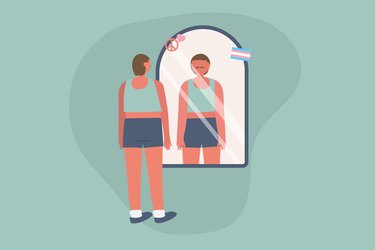
Menopause is known for its lousy reputation: hot flashes, mood swings, vaginal dryness. Most of the time, it happens to people with uteruses in their late 40s or early 50s as a natural part of aging, according to Planned Parenthood.
But not always: There's a condition called medical menopause that can happen due to a variety of conditions or procedures, including gender-affirming care.
Video of the Day
Regardless of the reason you're experiencing medical menopause, there are ways you can care for yourself and mitigate the associated symptoms.
A Note on Language
Here at LIVESTRONG.com, we make deliberate choices about the language we use. We typically avoid language that implies a sex or gender binary in favor of more accurate and inclusive language, unless that is the language used by the primary source.
What Is Medical Menopause?
"Menopause occurs due to a decrease in hormones produced by the ovaries," says Nisarg Patel, MBBS, an ob-gyn at Nisha Women's Hospital and IVF Centre and ClinicSpots. "This reduction usually happens gradually over time, with most women experiencing it between the ages of 45 and 55."
But other people may experience it earlier. Going through menopause before midlife can be challenging when most of the available resources for managing the change are made for those in their 40s and 50s. A 20-year-old experiencing medical menopause due to cancer treatment may not feel comfortable using resources intended for older folks, for example.
Likewise, a transgender man may not feel comfortable in a women's clinic. However, as part of their medical transition, they may also experience medical menopause and need just as much support as anyone else going through a similar process.
"Medical menopause, also known as induced menopause, occurs when a person's ovaries are surgically removed or damaged through radiation or chemotherapy," says James Walker, MD, medical advisor at the health care platform Welzo.
That results in "an abrupt cessation of estrogen and progesterone production," Dr. Walker explains. Those hormones are responsible for regulating the menstrual cycle; without them, people with uteruses may experience a variety of physical and emotional symptoms, he says.
Who Experiences Medical Menopause?
Chemotherapy or radiation that targets the reproductive system can disrupt hormone production and damage the ovaries.
"Surgical removal of the ovaries, known as an oophorectomy, can also trigger medical menopause," says Ooha Susmita, MBBS, MD, a psychiatrist and sexual wellness expert with the digital sexual health platform Allo Health. "This procedure is sometimes done as part of a hysterectomy, which involves removing the uterus."
Chemotherapy isn't the only reason someone might experience medical menopause. "Other medical conditions, such as premature ovarian failure or certain autoimmune disorders, can also cause medical menopause," Dr. Susmita says. These include rheumatoid arthritis, thyroid disease and Crohn's disease, according to the Cleveland Clinic.
But medical menopause can also happen to trans people who are undergoing hormone therapy, Dr. Walker says. "In these cases, testosterone therapy can lead to a cessation of estrogen production and the onset of medical menopause."
Surgical removal of the ovaries in trans men can also cause medical menopause, says Kimberly Shaw, CNM, a certified nurse midwife at Cone Health in North Carolina.
Transgender women can also experience medical menopause in certain situations, Dr. Susmita says. This is typically because they need to stop their hormone therapy for something like "an upcoming surgery or age-related reasons," she says, "and the symptoms are very similar to those seen in cisgender women."
Symptoms of Medical Menopause
Medical menopause usually comes with symptoms close to those of natural menopause, according to Shaw and Dr. Susmita.
These include, according to the Mayo Clinic:
- Hot flashes
- Mood changes
- Vaginal dryness
- Night sweats
- Decreased libido
- Fatigue
- Difficulty sleeping
But everyone is unique, so you may or may not experience these or other symptoms with menopause.
5 Tips for Taking Good Care of Yourself
Just as there's no guarantee which medical menopause symptoms you'll experience, there's no one-size-fits-all approach when it comes to managing those symptoms either, Dr. Walker says.
People experiencing symptoms due to chemotherapy or ovary removal will need different treatment and care than individuals undergoing gender-affirming hormone therapy and experiencing medical menopause as part of their transition.
"It is important to note that the management of medical menopause is highly individualized, and treatment options should be discussed with a health care provider," Dr. Walker says.
You want that doctor to know their stuff, too. "It is important to work with a knowledgeable health care provider who can provide guidance on the most appropriate treatment options for each individual patient," Shaw says.
1. Talk to a Doctor About What You're Experiencing
Your doctor can't help you if they don't know what you're going through, so talk to them about your symptoms, Dr. Patel says.
Once they know what you're up against, they may be able to suggest lifestyle changes that could help, he says, such as getting plenty of sleep, eating a balanced diet and exercising regularly, as well as medical treatments. (More on those options below.)
Ideally, your doctor would have also let you know when to expect symptoms of medical menopause even before they start, depending on your scenario.
2. Consider Hormone Therapy
One of the most commonly recommended treatments for medical menopause in people with uteruses is hormone therapy (HT), sometimes called hormone replacement therapy (HRT).
"To manage symptoms of medical menopause, patients may consider HRT, which involves taking estrogen and/or progesterone to replace the hormones that the body is no longer producing," Dr. Walker says.
HT is not to be confused with gender-affirming hormone therapy (GAHT), which is when people who are trans use hormone therapy as part of their medical transition.
GAHT for transgender men and other gender non-conforming individuals can lead to medical menopause. These folks couldn't take systemic hormone therapy, as it might interfere with their transition. However, they can benefit from using a topical estrogen cream to treat vaginal dryness and atrophy, for example.
3. Explore Other Medications
Seeing a doctor for treatment of medical menopause can help you get access to prescription medications that can manage or reduce symptoms. These medical treatments won't make menopause stop, they simply make the symptoms easier to tolerate.
These might include, according to the Mayo Clinic:
- Vaginal estrogen, which can be applied via a cream, ring or tablet to reduce vaginal dryness and other urinary symptoms.
- Low-dose anti-depressants, specifically SSRIs, which may reduce hot flashes and mood symptoms.
- Gabapentin, a nerve medication, which can reduce nighttime hot flashes.
- Osteoporosis medications that can prevent or treat bone loss.
4. Implement Lifestyle Changes
One of the best things you can do to manage medical menopause is to foster relaxation and calm in your life.
"HRT can help alleviate many of the symptoms of menopause, but it is not suitable for everyone," Shaw says. "Other options include lifestyle modifications, such as regular exercise, a healthy diet and stress-reduction techniques."
Here are a few ways to get started:
5. Find Your Community
Community support can be key for navigating medical menopause, says Kryss Shane, PhD, LMSW, a professor, educator and social worker.
"The collective of those who do not fit the traditional experience of menopause is growing," Shane says. "Internet communities offering guidance and support prove to be invaluable resources."
Online or in-person support groups can help you feel like you're not alone. Knowing other people have been where you are can create a sense of relief and validation that your experience is understood by at least one other person.
Is this an emergency? If you are experiencing serious medical symptoms, please see the National Library of Medicine’s list of signs you need emergency medical attention or call 911.







